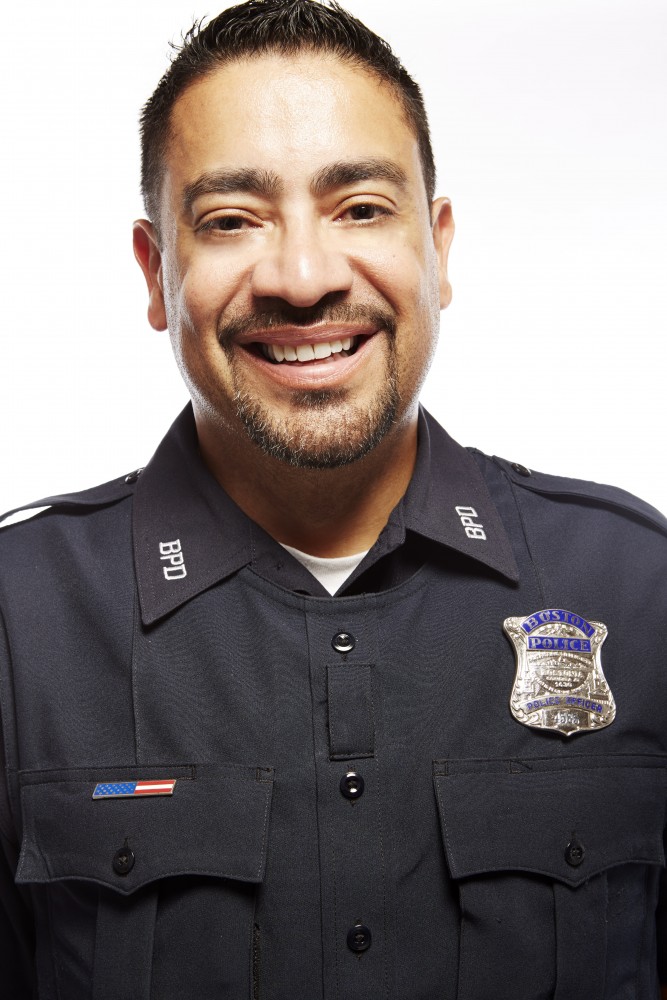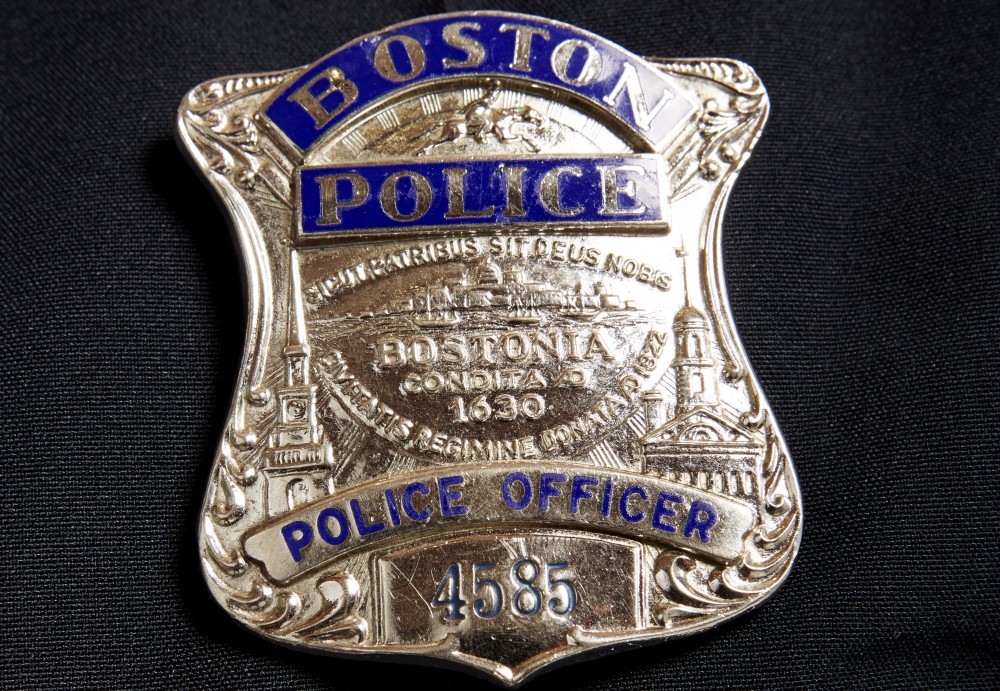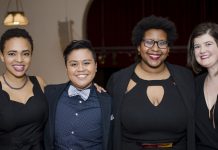Boston Police Department LGBT Liaison Javier Pagan details his experience as a first responder at the Boston Marathon blasts
Javier Pagan was just feet from the finish line when he heard the boom. But when you’re a first responder in a time of crisis, it’s not the terror of the first explosion that tests your courage. It’s the knowledge of the second.
“You hear a lot, ‘Where there is one bomb, there are probably two,’” explains Pagan. “The second one is always there to kill the first responders. Because regardless of what is happening, they’re going to go rushing in.”
And when he heard that first boom, that’s exactly what Pagan did: he rushed in. Most of us watched the horror unfold, hand over mouth in shock and sadness, from behind the shield of a TV screen. But he was there. He heard the boom. And he rushed toward it. Was he scared?
“Was I scared?” answers Pagan. “I don’t think I had time to be scared.”

For Boston Police officer Javier Pagan, April 15, 2013 started like any other Marathon Monday. But when two pressure cooker bombs planted by brothers Dzhokhar and Tamerlan Tsarnaev exploded near the finish line at 2:49 p.m., killing three spectators and injuring 264, the day was changed for everyone. The rest of the week went by in a blur: grief, anger, surveillance photos, news cameras, a memorial service, a manhunt. By the time it was over, another victim had been tragically laid to rest. Boston, though, proved resilient – and its people stronger and more united than ever.
Things were different for Pagan, too. A photo by Boston Globe photographer John Tlumacki, taken within seconds of the first explosion, had become perhaps the most iconic single image associated with the Marathon bombings. It shows Pagan and two fellow officers springing into action, a runner jolted by the blast fallen at their feet. It was splashed across newspapers, magazines and social media. And it famously made the cover of Sports Illustrated, making Pagan possibly the first out gay man to claim that distinction.
Oh yeah, he’s gay. In fact, for the past 12 years Pagan has served as the Boston Police Department’s liaison to the LGBT community. His association with the now-iconic photograph has resulted in lots of attention: the community has bandied with pride the words “gay hero.”
But on Marathon Monday, says Pagan, he was just doing his job. And a month after the bombings, the memories are still vivid. “You can still see the image of people laying there, hearing people scream,” he recalls, while sitting on a Boylston Street patio just a few blocks from the site. His police car looms over his shoulder, parked at-the-ready by the curb.
“My post was right where the first explosion happened,” explains Pagan. It seemed like an ordinary Marathon, he says, no different than the past 17 or so he had worked; his job was to face the crowds and keep the barricade secure, lest some overzealous spectator jump the gate and interfere. Once the winners were crowned, he stayed nearby but stepped aside – to keep his face out of the photos of every reunited family. Like the rest of the crowd, he was applauding the runners.
Then, boom. At first he thought maybe a manhole had exploded, or even perhaps that a massive speaker had blown.
But as he sprang into action, running to the source of the sound, it became clear it was something much, much worse. “The shock hits you,” he remembers. “You see bodies, you see body parts: things that should not be, like legs flipped the wrong way.”
No time to second-guess. “Once you realize something is happening, you just go into action,” says Pagan. By the time the second explosion occurred about 13 seconds later, the radios were “going crazy,” says Pagan. He says the scene around him was one of “controlled chaos,” with officers and civilians alike tearing down barricades to help the panicked throngs get away from the blast, and rushing in to administer aid.
There was no hesitation, he says, no time to consider if there could be more explosions. “Your adrenaline, everything you’ve been taught, and your life experience as an officer just kicks in,” says Pagan. “You react. It’s like something takes over. You think: this is danger. And then you just go.”
While Pagan’s bravery might be instinctual, the result of a first responder’s ingrained training, he says he was struck by the reactions of bystanders. Marathon volunteers who thought they’d be passing out water to parched runners, and spectators who thought they’d be cheering on friends and family, were now offering themselves up to help strangers: without hesitation, Pagan observed, and even as the situation remained unclear and the threat of even more devastation loomed.
“Police officers, firefighters, EMS… it’s our job to run into these things,” says Pagan. “But for everyday people who don’t train for it, for them to go in and do that is amazing.”
“They were incredible,” says Pagan. “It really showed the best of people, even in such a dark time.”
The entire incident sped by in a flash of that “controlled chaos” Pagan described. Medical units had victims away from the scene in less than 12 minutes, he said, and then the bomb squad moved in to secure the scene. Tensions were high, especially with so many now-abandoned bags in the area. “They always say, if you can see the bomb then the bomb can see you,” says Pagan.
Still, sometime in that blur of events, Tlumacki had managed to snap the now famous photo of Pagan and his fellow officers. Naturally, Pagan didn’t notice the photo being taken—but it was impossible to miss the resulting image. By the time he saw it a few days later, it had gone viral through print and social media. And lots of people wanted to talk to Pagan: from city newspapers around the country to national political commentators like Rachel Maddow.
“Somehow Anderson Cooper’s people found my sister’s home phone number,” says Pagan. Complete strangers were reaching out with Facebook friend requests. At first, it was almost a little jarring. “You’re like, come on, people. Something just happened,” says Pagan. He limited his conversations with the media, giving a few interviews and flying to Miami for an appearance on Telemundo with Carlos Arredondo, the “cowboy hat hero.”
Receiving particular attention was Pagan’s status as an out officer—which was somewhat ironic, considering his sexuality had never really been the focus of much attention on the force or in his life. His coming out was pretty smooth: “You’re nervous any time you come out, because you don’t want rejection,” says Pagan, who was born in Puerto Rico but has lived in Boston since he was three. “But I never had any horror stories.” His family and friends were supportive: “My sisters were like, ‘we kind of just wanted you to say it!’” And things were no different in the BPD. After Suffolk University he entered the police academy, where he shared classes with both an openly gay and lesbian officer. When Pagan came out after his first year on the street, the reaction was—well, not much of a reaction.
“It was, ‘oh, okay—who cares?’” says Pagan. “At one point I worked with a lot of Latino officers, and I thought maybe the whole machismo thing might be a factor. But they were the most supportive. We were working in the South End; you see gays everywhere! It’s not like I was working with cavemen and cavewomen.”
Though his experiences being out on the force have been positive, Pagan understands that it’s still helpful for the wider community to have a personalized connection with the BPD. So 12 years ago he added the role of LGBT Liaison to his work as a Community Service Officer. There are still some folks who may not feel comfortable blindly reaching out to the police about certain issues, like to report same-sex partner violence, says Pagan. Plus his liaison role offers a unique opportunity to reach out to the community and investigate murder, assault or other cases related to LGBT victims. He even lends his expertise in more unexpected ways: like helping the Boston Pride committee organize its security details for the annual events, and navigate the bureaucratic process of pulling necessary permits and licenses. And on May 17, 2004, the day that the Massachusetts Supreme Judicial Court ruled in favor of marriage equality, it was Pagan who escorted lead counsel Mary Bonauto to City Hall Plaza.
“It’s nice to be able to say I was there for that good part of history, too,” says Pagan.
Given his involvement in the community, it’s no surprise that Pagan’s national notoriety was a source of pride to LGBT friends and colleagues.
“I was a local boy, and people were proud to say, ‘this is our friend. This is our gay liaison,’” says Pagan. He’s grateful for the appreciation, but quick to remind that the photo is, quite literally, a snapshot of just a few people who demonstrated courage that day. “When it comes to getting called the word ‘hero,’ I’ve learned to say ‘thank you’ and walk away,” he explains. “That picture is of three people, but there were so many more that to me are heroes. We had officers there taking off their gun belts and tying it around people.”
Still, the impact that comes with being a highly visible gay cop—particularly one who served in a time of national tragedy—is not lost on Pagan. “It gives the radicals these images that show gay people are not sinners, or all these horrible things that they come up with,” says Pagan. “And I hope it gives hope to young kids who don’t have the luxury of growing up with families that are accepting. If they can turn on the TV and say, ‘Look, there’s a gay police officer!’ or a gay basketball player or entertainer, that’s a good thing.”
Pagan says the response to his status as an out officer has been overwhelmingly positive. Still, there’s bound to be some inevitable backlash. “You have some people saying, ‘who cares that he’s gay? What difference does it make?’” says Pagan. And then there was a YouTube video that his friend found online: some user had created a slideshow of images of Pagan set to the tune of the Village People’s “YMCA.” At the end, up popped an image of a wholly separate Javier Pagan, a sex offender in Florida with a completely different middle name. “It said something like, ‘the Boston Police lets sex offenders work for them!’” remembers Pagan. Naturally, he says, the department contacted Google and the video was removed. But it’s a reminder that there is still bigotry out there looking to unjustly target even community heroes.
And to that point, though Pagan says he never expected for the photo to become politicized, he hopes that attention around a gay first responder can raise some important questions about his equality as a citizen. “The thing is, what if I had died?” says Pagan. “The fact is that I’m married in Massachusetts, but get no federal benefits. Things like this are a reminder [to politicians] that this is not a game you’re playing: these are real people’s lives you’re making decision about from where you sit in Washington, DC.”
And in fact, his marriage has not one hero—but two. Ironically, Pagan’s husband Pedro is a retired NYPD sergeant who helped rescue victims from the collapsed towers on September 11, 2001; a photo of him helping a victim was one of the more widely seen images in the wake of that tragedy.
“What are the chances, two gay cops, now married, in photos like that?” Pagan says.
The chances are certainly pretty slim. But Pagan says having a husband who understood what he went through also helped him to manage the expected raw emotions that followed the tragedy. On the Wednesday after the Marathon he took a day off to decompress, and he tuned out the Friday coverage of the manhunt for the bombers. All the bravery and first responder training can’t always prepare you for the reality.
“Afterwards the emotions hit you,” says Pagan. “Sometimes I’d just be driving home and it would hit me: this sense of sadness. This wonderful day was changed.”
But like the rest of Boston, Pagan remained strong in the face of sadness and fear. “That’s one thing about this city, we don’t give in to it,” he says. “It was shocking. It was tragic. I’ll never forget it. It’s in here,’ he says, clutching to his heart. “But it’s not stopping me. If it affected me to the point where I wasn’t coming to work, it ruined relationships with friends or colleagues, or it affected my marriage, then they would have won. And so that’s not going to happen.”
So Pagan keeps his mind on the positives: from the examples of heroism he saw from not-so-average citizens, to the hugely warm reception he has received as a gay role model of police work. And armed with a quick sense of humor, he finds ways to laugh, too: particularly at himself.
“I get through things with humor. And we all think it’s funny, because out of all the people at the station I am the least athletic person,” laughs Pagan of his photo landing on the cover of Sports Illustrated. A large copy of the image, a gift, now adorns the station. “I had been doing CrossFit for a year, and had just lost ten to fifteen pounds. Thank god, because the camera adds ten pounds,” he chuckles.
“Of course, I said I would have preferred the swimsuit edition,” he adds with a laugh. Don’t worry, Kate Upton, your job is safe. But when it comes to being a role model, we’re glad to have Pagan front and center. [x]









